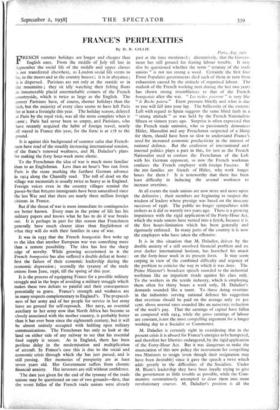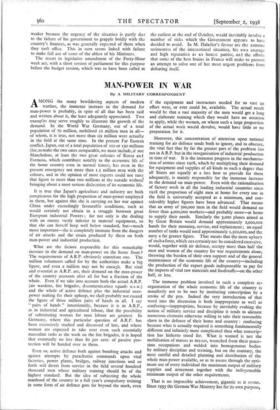FRANCE'S PERPLEXITIES
R. GILLIE By D.
FRENCH summer holidays are longer and cheaper than English ones. From the middle of July till late in September the social life of the middle and upper classes is not transferred elsewhere, as London social life seems to be, to the moors and to the country houses ; it is in abeyance; it is dispersed. Parisians are not only at the seaside or in the mountains ; they sit idly watching their fishing floats in innumerable placid unremarkable corners of the French countryside, which is twice as large as the English. The poorer Parisians have, of course, shorter holidays than the rich, but the majority of every class seems to have left Paris for at least a fortnight this year. The holiday season, delayed at Paris by the royal visit, was all the more complete when it came ; Paris had never been so empty, and Parisians, who have recently acquired the habit of foreign travel, nearly all stayed in France this year, for the franc is at 178 to the pound.
It is against this background of summer calm that French- men have read of the steadily increasing international tension, of the franc's renewed weakness, and M. Daladier's plans for making the forty hour-week more elastic.
To the Frenchman the idea of war is much more familiar than to an Englishman. Less than an hour's 'bus run from Paris is the stone marking the- furthest German advance in 1914 along the Chantilly road. The toll of.dead on the village war memorials is usually twice as heavy as in England. Foreign voices even in the country villages remind the passer-by that 800,000 immigrants have been naturalised since the last War and that there are nearly three million foreign citizens in France.
But if the threat of war is more immediate its contingencies are better known. Every man in the prime of life has his military papers and knows what he has to do if war breaks out. It is perhaps in part for this reason that Frenchmen generally have much clearer ideas than Englishmen of what they will do with their families in case of war.
It was in 1935 that the French bourgeoisie first woke up to the idea that another European war was something more than a remote possibility. The idea has lost the sharp edge of novelty. While growing accustomed to it the French bourgeoisie has also suffered a double defeat at home : first the failure of their economic leadership during the economic depression ; secondly the tyranny of the trade unions from June, 1936, till the spring of this year.
It is the process of equipping France for a possible military struggle and in the hope of avoiding a military struggle which makes these two defeats so painful and their consequences potentially so grave. France's strength and weakness are in many respects complementary to England's. The prepared- ness of her army and of her people for service in her army leave no ground for self-reproach.. Her navy, an essential auxiliary to her army now that North Africa has become so closely associated with the mother country, is probably better than it has ever been since the eighteenth century, but it will be almost entirely occupied with holding open military communications. The Frenchman has only to look at the land on either side of any railway to see that his essential food supply is secure. As in England, there has been perilous delay in the modernisation and multiplication of aircraft. In France's case this is due to the social and economic crisis through which she has just passed, and is still passing. Her memories of prosperity are at least seven years old. Her Government suffers from chronic financial anxiety. Her investors are still without confidence.
The date just given for the end of the tyranny of the trade unions may be questioned on one of two grounds—first, that the worst follies of the French trade unions were already Paris, Aug. 29th past at the time mentioned ; alternatively, that the Govern- ment has still ground for fearing labour trouble. It may also be questioned whether the term " tyranny of the trade unions " is not too strong a word. Certainly the first four Front Populaire governments died each of them in turn from exhaustion caused by the attitude of organised labour. The outlook of the French working man during the last two years has shown strong resemblances to that of the French bourgeoisie after the war. " Les riches paieront " is very like "-le Boche paiera." Exert pressure blindly and what is due to you will fall into your lap. The bellicosity of the extremz Left with regard to Spain suggests the same blind faith in a " strong attitude " as was held by the French Nationalists fifteen or sixteen years ago. Surprise is often expressed that the French trade unionist, who so passionately denounces Hitler, Mussolini and any Frenchman suspected of a liking for them, should have been so slow to understand France's need for increased economic productivity in the interest of national defence. But the confusion of international and internal politics plays a part in this, for just as the French Nationalist used to confuse the Frenchman of the Left with his German opponent, so now the French workman confuses the French employer with foreign Fascists. If the zoo families are friends of Hitler, why work longer hours for them ? It is noteworthy that there has been least difficulty in inducing the arsenal workmen to increase overtime.
At all events the trade unions are now more and more upon the defensive ; their members are beginning to suspect the wisdom of leaders whose prestige was based on the insecure successes of 1936. The public no longer sympathises with strikers as it did so warmly two years ago. There is a growing impatience with the rigid application of the Forty-Hour Act, which the trade unions have turned into a fetish, because it is the first hours-limitation which has been generally and rigorously enforced. In many parts of the country it is now the employers who have taken the offensive.
It is in this situation that M. Daladier, driven by the double anxiety of a still unsolved financial problem and an ever darker international horizon, has launched his attack on the forty-hour week in its present form. It may seem carping in view of the combined difficulty and urgency of the problem to criticise the way in which it was done. The Prime Minister's broadcast speech sounded to the industrial workman like an impatient tirade against his class only. To the workers in the textile industry, which is employing them often for thirty hours a week only, M. Daladier's demands sounded like a taunt. To those doing overtime in the industries serving national defence his suggestion that overtime should be paid on the average only Jo per cent. above normal rates sounded like an autocratic reduction of the week's pay. That the earnings of capital have fallen as compared with 1914, while the gross earnings of labour are constant, is not the most compelling argument for a longer working day to a Socialist or Communist.
M. Daladier is certainly right in considering that in the present crisis it is absurd for France's energies to be hampered, and therefore her liberties endangered, by the rigid application of the Forty-Hour Act. But it was dangerous to make the enunciation of this new policy the instrument for compelling two Ministers to resign (even though their resignation may have been desirable) since it gave the speech a twist which adds greatly to the difficulties of the Socialists. Under M. Blum's leadership they have been loyally trying to give the government as little trouble as possible, while the Com- munists ostentatiously attempted to draw them into more revolutionary courses. M. Daladier's position is all the weaker because the urgency of the situation is partly due to the failure of his government to grapple boldly with the country's finances, as was generally expected of them when they took office. This in turn seems linked with failure to make full use of some of the ablest of his Ministers.
The resort to legislative amendment of the Forty-Hour week act, with a short session of parliament for this purpose before the budget session, which was to have been called at the earliest at the end of October, would inevitably involve a number of risks which The Government appears to have decided to avoid. In M. Daladier's favour are the extreme seriousness of the international situation, his own courage and high reputation as an honest patriot, and the efforts that some of the best brains in France will make to prevent an attempt to solve one of her most urgent problems from defeating itself.







































 Previous page
Previous page